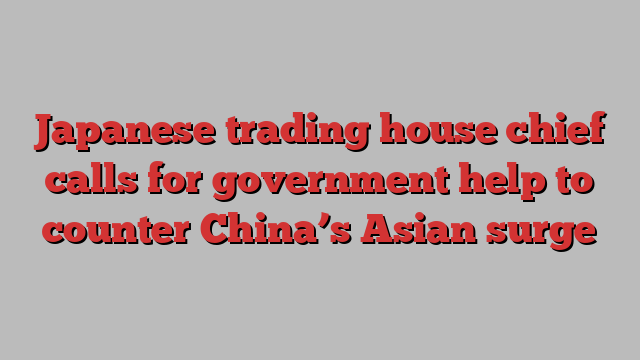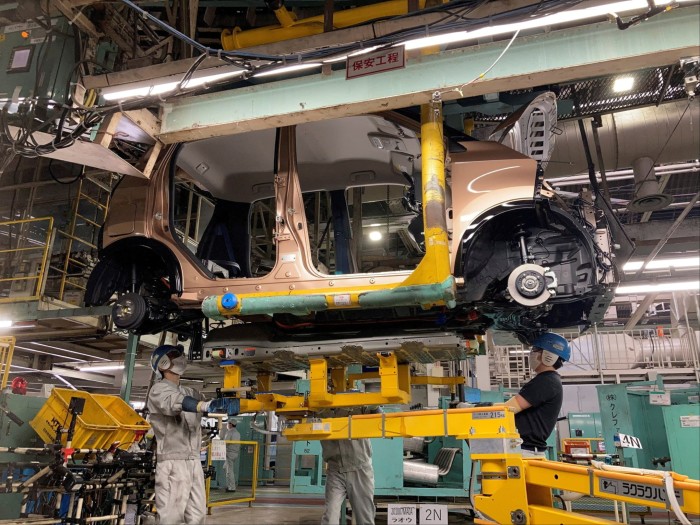
Stay informed with free updates
Simply sign up to the Japanese business & finance myFT Digest — delivered directly to your inbox.
The chief executive of Mitsubishi has called for a more active strategy from the government to help Japanese companies counter increasing Chinese competition in their traditional stronghold of south-east Asia.
Katsuya Nakanishi said the Warren Buffett-backed trading house is on alert for decoupling risks as rising import tariffs in the US and Europe force China to expand its influence in Asean markets.
“One company can no longer win on its own,” Nakanishi said, in a Financial Times interview at the company headquarters in Tokyo. “The government should support companies and step in to compete against China since the competitor is so big.”
Nakanishi’s comments echo the alarm privately expressed by other executives and government officials, who fear Japanese market share in south-east Asia is being eroded as Chinese companies increase exports and investment.
“Japanese OEMs [original equipment manufacturers] export automobiles to the world and Asean is a major market for Japanese OEMs. If Japanese OEMs lose their share, that impacts the Japanese economy as well,” Nakanishi said.
With China having a strong grip on battery materials and rapidly expanding electric vehicle sales backed by massive government funding, Nakanishi argued that Tokyo’s historical ties with Asean countries were no longer enough to compete against Beijing on batteries and electric vehicles.
With Japan unable to compete with the size of financial support provided to Chinese companies by Beijing, he added that the government needed to offer a more compelling package that combined investment with technology to help south-east Asian countries decarbonise and hit their emissions targets.

Mitsubishi, with $6.4bn in annual profits, is one of the biggest of the sogo shosha, or general trading houses, with a long history of navigating complicated geopolitical situations.
From its origins in the 19th century, the group has played a pivotal part in securing everything from Indonesian nickel and Canadian lithium to Norwegian salmon for a resource-poor country. But its role has evolved significantly over time from a commodities specialist to a wide-spanning investment group that currently sits somewhere between global venture capital and private equity.
“The point of the shift in strategy is that they want to reduce their reliance on resource trading and prove themselves as investors. The issue is that they are still heavily reliant on resources,” said Edward Bourlet, an analyst at CLSA.
Mitsubishi’s unique and diversified business model has attracted investment from Warren Buffett’s Berkshire Hathaway, which now holds 9 per cent in each of Japan’s five largest trading houses. Mitsubishi shares have almost quadrupled in value since Berkshire Hathaway’s buy-in, which became public in 2020.
Before Buffett drew global investor attention to Japanese trading houses, the complexity of their business portfolio kept their shares at a discount. Now, at a time of geopolitical uncertainty and disruption in technology and energy, Nakanishi argues the diversity of a conglomerate business has become a strength.
“Our origin is trading and exporting of high-quality Japanese goods but we then moved into investment and now, we’d like to manage and operate the companies by ourselves,” Nakanishi said, noting its longer investment span compared to private equity. “We are also able to create new businesses by integrating the various things we do within our group.”
Nakanishi said that Mitsubishi’s involvement across entire supply chains — including for battery production, electric vehicles and power generation — gave it an edge over private equity and other investment groups who focused on one business area.
“Due to their connections across government and industry, they have insane access to information,” said Bourlet, adding that the trading houses had started to cover their cost of capital over the past few years but still needed to prove they could continue to do so, even if commodity prices fell sharply.
“They need to prove they can execute. And that means getting better at finding exits for their investments,” he said.
Nakanishi himself admits execution of its changing business model will be Mitsubishi’s next challenge.
“There is always life expectancy to a business, so we need to be one step ahead in figuring out how the business will evolve. It may be that the business will come to an end, or it may make more sense to transfer the business to a more natural owner,” Nakanishi said. “We are in the process of evolving.”

